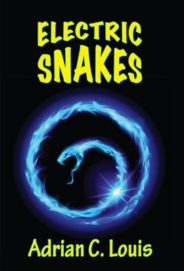 Adrian C. Louis
Adrian C. Louis
Backwaters Press ($16)
by Warren Woessner
The title of this poetry collection is an elaboration of its epigraph by D. H. Lawrence: “The world of men is dreaming. / It has gone mad in its sleep, / and a snake is strangling it / but it can’t wake up.” Adrian C. Louis’s “Electric Snakes” are manifested as fourteen prose poems with numbered sections that illustrate the main themes of the book. More “conventional” poems are spacers between the “Snakes.”
This collection is also geographically circumscribed. Most of the present-day action takes place between Marshall, Minnesota, where Louis was an English professor at Minnesota State University, and Sioux Falls, South Dakota. Much of this region is Trump country, and not a few of the poems in Electric Snakes lament his election and fear for the future. “Electric Snakes #12” starts out as a celebration of a good night’s sleep, but then veers into inauguration day:
I live alone so I slept with the television on & awoke
to an odious shit-goblin being sworn into our highest office.
Friends, it’s morning but the sun is setting. The sun is setting
& incomprehensible evil is rising.
Louis is in his sixties and is fearlessly adopting the persona of a grouchy old man. He is in the years of life between retirement and infirmity, and there are a lot of questions, regret, and sorrows in these poems, but they aren’t self-pitying. The poet’s body may be falling into disrepair but he still can pull a laugh out of situations that would otherwise just be a whiny reflection on mortality. Take “Electric Snakes #14”:
An ancient man crawls out of bed & enters the world
the wrong way & twists his trick knee. His goddamned
knee hurts like a son of a bitch, so he is full-on
cantankerous . . . his faith dissolved. Today he will not do the
pony like Bony Maronie even if he could remember how.
Louis, a self-described “half-breed Indian” who grew up in Nevada, in the “blood-drying wind,” tells us that the “ghosts in the Great Basin are insistently calling me home.” This move is unlikely, however, as Louis has learned to love hating Minnesota:
I think I am still alive, but alive in
Minnesota is a slow death. This is the frozen land of the dull
& the dead. Dull & dead earth, dull & dead humanity, dull
& dead weather. I type out “Minnesota sucks the scrotum
of Satan” and post it.
Still, Native-American themes and story-telling are threads that run through many of these poems. Some of the stories only take a few lines, as in a section of the sequence “Skinology”:
I have known
Some badass Skins.
Clichéd bad-to-the-bone
Indians who were maybe
not bad but just broke,
& broken for sure.
Some of the most moving poems contain the poet’s longings for a lost lover, one he would literally die to join. In “Got Those Lonesome Blues In Small-town Minnesota,” Louis moves from thoughts about the sounds of trains at midnight to speak to her:
Darling, I was dreaming of you
when trains pulled me awake
& our wet lips parted ways.
The last time I kissed you
was ten years ago. I shivered
while you slept in your coffin.
Even as he describes himself as a ghost, a hermit, or a zombie, Louis is brought to life by the pleasures of the flesh that he can still sensually access, such as college girls sunning in the park:
Firm bottoms & bellies & heads filled with helium. The good ole USA. The euphoric scent of Coppertone simmering on the skin of young women. I inhale the intoxicant as I slowly drive by.
Although Electric Snakes is suffused with mortality and the ghosts that surround him, Louis is not quite ready to stop telling us his stories. As he puts it in “Electric Snakes #2”: “So when I say poets should write poems & otherwise shut the fuck up, I pretend I am not talking to myself.”
